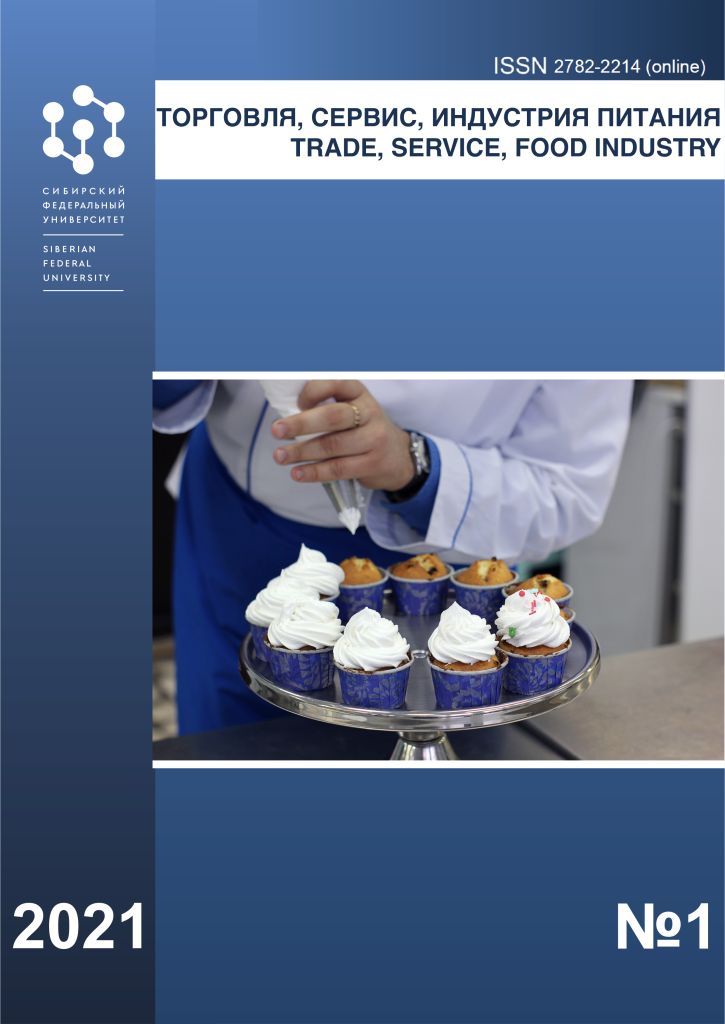from 01.01.2019 to 01.01.2020
Krasnoyarsk, Russian Federation
Krasnoyarsk, Russian Federation
Krasnoyarsk, Russian Federation
UDC 33
CSCSTI 06.81
Russian Library and Bibliographic Classification 6542
Russian Trade and Bibliographic Classification 7736
The article discusses the issues of interaction between participants in the retail footwear market. Strong competition in the footwear retail market encourages a full analysis of the environment in which the main players interact. The main emphasis in the study is made on the analysis of the characteristics of functioning between the leading participants in the retail footwear market in the state. The authors of the study singled out market participants, described their main goals, objectives, tools and interaction criteria. A scheme for the functioning of the state economy is proposed, based on mutually beneficial relations between the seller and the buyer, as well as their relationship with the state, the Chamber of Commerce and the Russian Union of Industrialists and Entrepreneurs. The main objects of the considered by the authors in the field of retail trade in footwear are the relationships of market participants, their form and characteristics, as well as the principles that the participants follow when performing any actions.
competitiveness, retail market, footwear market, interaction of enterprises, essence of retail trade, market participants
1. Belonogova, E.V. & Suslova, Yu. Yu. (2011). Indicators for assessing material incentives for workers from the perspective of interested users. Russian Entrepreneurship. No. 8-1. Pp. 119-124.
2. Voloshin, A.V. & Alexandrov, Yu.L. (2017). Conceptual approach to the mechanism of forming the competitiveness of organizations on the market of educational services of higher education. Fundamental research. No. 9-1. Pp. 153-158.
3. Voloshin, A.V. & Alexandrov, Yu.L. (2017). Competitiveness of Higher Education Institutions in the Market of Educational Services: Methodical Approach to Assessment. Fundamental research. No. 12-1. Pp. 181-186.
4. Voloshin, A.V. & Alexandrov, Yu.L. (2017). Methodology for assessing the competitiveness of organizations on the market of educational services of higher education. No. 9 (308). Pp. 108-118.
5. Voloshin, A.V. Demchenko, S.K., Suslova, Yu. Yu., Kalyuzhnova, N. Ya. & Kayachev, G.F. (2019). Review of models of evolutionary development of socio-economic systems. Economy and Entrepreneurship. No. 7 (108). Pp. 202-205.
6. Voloshin, A.V., Demchenko, S.K. & Suslova, Yu. Yu. (2019). The genesis of the categories "evolution" and "development" of economic systems in economic science. Bulletin of the Altai Academy of Economics and Law. No. 12-2. Pp. 51-60.
7. Voloshin, A.V. Demchenko, S.K. & Suslova, Yu. Yu. (2019). Theoretical approaches to the essence and classification of socio-economic systems in modern economic theory. Economics and Entrepreneurship. No. 7 (108). Pp. 153-161.
8. Kurochkina, A.A., Suslova, Yu. Yu. & Yabrova, O.A. (2013). State regulation and support of entrepreneurial activity in recreational zones of the region. Scientific and technical statements of the St. Petersburg State Polytechnic University. Economic sciences. No. 1-1 (163). Pp. 44-54.
9. Ivannikova, M.N. (2013). Formation of the essence of enterprise competitive advantages and their. Bulletin Belgorod University of Cooperation, Economics and Law. No. 2 (46). Pp. 325-329.
10. Kachalina, L.N. (2006). Competitive management. Moscow. Eksmo. 464 p.
11. Kravchenko L.I. (2009). Analysis of economic activity in trade. Moscow. New edition. 544 p.
12. Matvienko, O.I., Saramkova, K.A., Suslova, Yu. Yu. & Voloshin, A.V. (2018). Theoretical approaches to the definition of the essence of entrepreneurial networks and network interaction. Economy and Entrepreneurship. No. 7 (96). Pp. 738-742.
13. Levy, M. & Weitz, B.A. (1999). Retail Fundamentals. SPb. Piter Publishing House. 448 p. (in Russian)
14. Naumov V.N. (1999). Sales Marketing. Publishing house of St. Petersburg state University of Economics and Finance. 77 p. (in Russian)
15. Suslova, J.J. & Voloshin A.V. (2017). The production potential of the agroindustrial complex of the Siberian federal district - the basis for the development of the food market of the region. Journal of Siberian Federal University. Humanities and Social Sciences. T. 10. No. 11. Pp. 1789-1797.
16. Suslova, Yu.Yu. (2007). Market infrastructure of the city: theory, methodology, practice. Moscow. Creative Economy. 176 p.
17. Suslova, Yu.Yu. Demchenko, S.K. & Demchenko, O.S (2015). Scenario forecast of Russia's economic development for 2015-2017 and stabilization policy. Bulletin of the Irkutsk State Economic Academy. Vol. 25. No. 1. Pp. 13-20.
18. Suslova, Yu.Yu. (2007). "And we threw the net ...". Structural and functional approach to the study of market infrastructure. Russian Entrepreneurship. No. 10-2. Pp. 179-183.
19. Suslova, Yu. Yu. & Demchenko, O.S (2016). Economic structure and structural policy as factors of macroeconomic dynamics in a crisis. Fundamental research. No. 3-2. Pp. 423-427.
20. Suslova, Yu. Yu. (2009). Market infrastructure: theory, methodology, development problems (reproductive aspect). Krasnoyarsk. 390 p.
21. Suslova, Yu. Yu. (2007). Methodological approaches to the study of market infrastructure as a factor of social division of labor. Problems of modern economics. No. 3 (23). Pp. 357-361.
22. Suslova, Yu. Yu.., Smolentseva, L.T., Nechushkina E.A. & Ivanova L.V. (2015). Integration processes in trade sector. Mediterranean Journal of Social Sciences. Vol. 6. No. 2. Pp. 145-150.
23. Savitskaya, G.V. (2017). Analysis of the economic activity of the enterprise. Moscow. INFRA-M. 378 p.
24. Solomatin, A. N. (2009). Economics, analysis and planning at the trade enterprise. St. Petersburg. Piter. 560 p.
25. Sysoeva, S. V., Krok, G. G. (2020). Big book of the store director. St. Petersburg. Peter. 528 p.
26. Tereshchenko, N. N. & Suslova, Yu. Yu. (2004). Income and profit of the enterprise of trade. Krasnoyarsk State trade and Economy in-t. 270 p.
27. Chenchenko, D. A. & Suslova, Yu. Yu. (2012). A systematic approach to regional market infrastructure formation. Russian Entrepreneurship. № 17 (115). Pp. 114-119.








